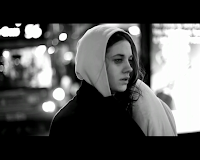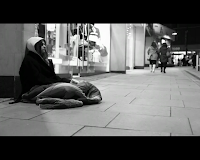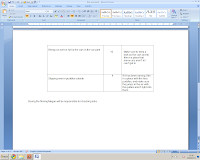The first video I will be analysising is Ed Sheeran's 'The A Team'.

Throughout the video there a few techniques that the camera uses again and again to portray a certain message to the audience. The pull focus shot is used constantly; either a pull focus, when the shot transfers from blurry to full focus, or when the shot goes from full focus to blurry, Perhaps to show that the girl is often out of focus within her own life,not always completely with it, and not thinking straight.


 There are also a lot of medium close ups, only ever showing her head and tops of her shoulders. Due to the camera effect being black and white, in three of these shots her white hood really stands out against the black of her coat, and therefore draws our attention to her face. Again the same
There are also a lot of medium close ups, only ever showing her head and tops of her shoulders. Due to the camera effect being black and white, in three of these shots her white hood really stands out against the black of her coat, and therefore draws our attention to her face. Again the same use of the black and white to highlight her dark smeared make-up and the paleness of her face; connoting to the audience that this is a young girl who is not living a healthy way of life.

Obviously by listening to the words in the video, it is clear that drugs abuse is the reason for this young girl being the way she is. When a packet of white powder/pills is shown in the second verse of the song, the shots are always very focused on the drugs themselves, and not the girl. This connotes that the drugs come first, and she comes after; they are vital to her living.


As the song is not very faced paced, the editing reflects this. Compared to say a fast dance video which has shot changes every couple of seconds, the shots in 'The A Team' are relatively long. Some of the shots last for at least 5 seconds enabling the audience, especially on the close up shots, to examine every part of the girls face. To watch her tear build, and then fall all the way down her face; this positions the audience to feel empathy for her, and interpret the video on a higher personal level.
 This establishing shot sequence straight away sets the tone for the rest of the video. The song is based on a lot of important issues; homelessness, drugs abuse, prostitution, and through the whole video it doesn't try to pretty up the issues, but shows them in real, blunt, shocking light. We are shown two young girls, one of whom is obviously dead on a park bench; the dead girl then becomes our lead protagonist, and we see what her life was life before, and why it lead to this. Even though it is the alive girl who we get the reaction shot of, it is clear that the dead girl is the important one. The last shot of this sequence show us an extreme close up, gradually zooming out and becoming further blurred of the young girls face. This is the first full face close up; the other girl does get a close up but it is shot of the side, not allowing the audience to see all of her face.
This establishing shot sequence straight away sets the tone for the rest of the video. The song is based on a lot of important issues; homelessness, drugs abuse, prostitution, and through the whole video it doesn't try to pretty up the issues, but shows them in real, blunt, shocking light. We are shown two young girls, one of whom is obviously dead on a park bench; the dead girl then becomes our lead protagonist, and we see what her life was life before, and why it lead to this. Even though it is the alive girl who we get the reaction shot of, it is clear that the dead girl is the important one. The last shot of this sequence show us an extreme close up, gradually zooming out and becoming further blurred of the young girls face. This is the first full face close up; the other girl does get a close up but it is shot of the side, not allowing the audience to see all of her face.
 The majority of the video has a black and white effect; this gives it an authenticity, and makes the last shot which is the only moment of colour in the entire video, have a lasting effect. The girl actually remains in black and white, but the sky is blue, and the houses are clearly their everyday colour. The girls white hood blends in with the sky, perhaps connoting to the audience, that she is now in the sky; she has died and no longer part of the coloured world.
The majority of the video has a black and white effect; this gives it an authenticity, and makes the last shot which is the only moment of colour in the entire video, have a lasting effect. The girl actually remains in black and white, but the sky is blue, and the houses are clearly their everyday colour. The girls white hood blends in with the sky, perhaps connoting to the audience, that she is now in the sky; she has died and no longer part of the coloured world.The location of the video changes as the story continues; it starts off in a park, but also shows the young girl on a high street, a bridge, a seedy hotel room, and a dingey looking flat. These are all settings that we can relate to as an audience, and therefore the video touches the viewer on a very personal level, we have all walked past people selling the big issue on the streets, and all walked past homeless people sat on the pavement. Because we form a connection with the young girl, and feel great empathy for her, we judge the people who walk past taking no notice, despite that being what we do everyday to real life people. The setting of the video contributes hugely to making the audience think, and realise just how brutal a life on the streets is.
 In this mid shot you can see the holes in the girls tights, the black coat which looks too big for her, the scruffy looking white hood and the sleeping bag that is wrapped around her skinny body to protect her from the cold. All of this clothing looks mismatched, and as if they weren't originally brought for her; connoting further to the audience the feeling of homeliness, and desperation; she will take any clothing she can, in order to keep herself dressed.
In this mid shot you can see the holes in the girls tights, the black coat which looks too big for her, the scruffy looking white hood and the sleeping bag that is wrapped around her skinny body to protect her from the cold. All of this clothing looks mismatched, and as if they weren't originally brought for her; connoting further to the audience the feeling of homeliness, and desperation; she will take any clothing she can, in order to keep herself dressed. The verses, choruses and bridges aren't punctuated in the sense that the same images, or setting is shown for each chorus etc, because the clips are just telling a day in the life of this young girl, perhaps her last day, and so the video has a very strong narrative. To go back and show the same clips for the choruses wouldn't make sense. However the shots do cut on the beat of the music, therefore enabling the visual and the music to flow effortlessly together. Not all the lyrics in the song are exactly acted out, but there are elements of synaesthesia in the video; in the first chorus Ed Sheeran sings 'Its too cold outside for angels to fly', there are two shots: a long shot, and a tracking shot, that are shown. Both of these shots have the word angel in them. The first shot we see shows the young girl stood in front of a flower stall, with the black and white effect cleverly used here to make her stand out against everyone else, with angel train station behind her. The colour white is associated with angels, and the whiteness of her sleeping bad and hood really draws the audiences eye to her, making us relate her to the 'angel' in angel train station. The second shot, a tracking shot of a sign which says 'Improving the angel' once again connects the girl to this idea of 'angels'; it could be said that Ed Sheeran is telling us she is an angel, just one that needs to be improved slightly, as the sign suggests.
The verses, choruses and bridges aren't punctuated in the sense that the same images, or setting is shown for each chorus etc, because the clips are just telling a day in the life of this young girl, perhaps her last day, and so the video has a very strong narrative. To go back and show the same clips for the choruses wouldn't make sense. However the shots do cut on the beat of the music, therefore enabling the visual and the music to flow effortlessly together. Not all the lyrics in the song are exactly acted out, but there are elements of synaesthesia in the video; in the first chorus Ed Sheeran sings 'Its too cold outside for angels to fly', there are two shots: a long shot, and a tracking shot, that are shown. Both of these shots have the word angel in them. The first shot we see shows the young girl stood in front of a flower stall, with the black and white effect cleverly used here to make her stand out against everyone else, with angel train station behind her. The colour white is associated with angels, and the whiteness of her sleeping bad and hood really draws the audiences eye to her, making us relate her to the 'angel' in angel train station. The second shot, a tracking shot of a sign which says 'Improving the angel' once again connects the girl to this idea of 'angels'; it could be said that Ed Sheeran is telling us she is an angel, just one that needs to be improved slightly, as the sign suggests.As I stated before there is a clear narrative throughout the story, however part of it is withheld from us. It is suggested right from the very first shot, in which we see our protagonist dead on a park bench, that this is a day in her life. However, we do not know if it is the day she dies, and we do not know exactly how she dies, despite it being made clear to us the whole way through that she is a drug addict, it is possible she died another way. The ending being withheld leaves the audience thinking; this video is making a clear statement, and wants the watchers to realise the horribleness of the situation, by leaving the end open, the audience doesn't go away thinking well this happened at the end, but is left pondering what happened to her?
 This video is very rare in that the singer of this song only appears once in the video, and it is not even made clear that it is him when he does arrive. Ed Sheeran is the only person who stops and buys a big issue from the girl, he also sits down and talks with her for while. We are being positioned by the shot, to think that he cares, he is the only person apart from the young girl crying over her body at the beginning, that stops to talk to her. Ed Sheeran has only released two videos; 'The A Team' and 'You Need Me, I Dont Need You', and he is not the main protagonist in either of them, this sends this message that perhaps he doesn't care about being in the front of the video, making his appearance known to everyone, he cares more about his songs, and their meaning.
This video is very rare in that the singer of this song only appears once in the video, and it is not even made clear that it is him when he does arrive. Ed Sheeran is the only person who stops and buys a big issue from the girl, he also sits down and talks with her for while. We are being positioned by the shot, to think that he cares, he is the only person apart from the young girl crying over her body at the beginning, that stops to talk to her. Ed Sheeran has only released two videos; 'The A Team' and 'You Need Me, I Dont Need You', and he is not the main protagonist in either of them, this sends this message that perhaps he doesn't care about being in the front of the video, making his appearance known to everyone, he cares more about his songs, and their meaning.Andrew Goodwin believed that there are three different types of music videos; literal (when videos use a set of images to illustrate the meaning of the lyrics and genre, for example 'Thats What I Go To School For' by Busted), amplified (where the meaning of the song is added to by the visuals, the visual images add an extra layer of meaning, for example 'Wannabee' by Spice Girls, and disjuncture (where the meaning of the lyrics is completely ignored, for example ''Fluorescent Adolescent' by Artic Monkeys. 'The A Team' is literal; there are moments where as Ed Sheeran is singing the lyrics it reflects exactly what is going on in the visual, he sings 'go mad for a couple grams', and we are shown a shot of drugs being received for cash. However most of the time, what we see isn't exactly what we hear, so it could be called amplified. But what we are hearing is about a young who is in the 'class A team', the song title suggest that she is hooked on class A drugs, and what we see throughout the whole video is a young girl who clearly suffers from drug abuse, and 'long nights strange men', although it is not at the exact same time as that lyric is sung, we do see her get into a car, go a hotel and have sex with a man for money.
Andrew Goodwin also stated that there is demand on the record company for a music video to contain lots of close-ups of the main artist/ vocalist, in Ed Sheerans 'The A Team', there are no close ups of Ed Sheeran at all, and only one long shot of him throughout the entire video. This demonstrates that perhaps he is authentic, and individual, and does not feel the need to place himself in full focus of the video.
Sven E Carlson said that the performer embodies one of three mythic roles; a commerical exhibitionist (not only an artist but a brand for example Lady Gaga), a electronic sharman (a mixture of the two, but reinforces 'star persona, for example Rhianna), and a televised bard (the artist acts as a story teller with use of on screen lyrics). It is clear that in this particular video that Ed Sheeran is 'a televised bard', he clearly tells us a story through the clips of the young girl, however I wouldn't go as far as to say that he is a televised bard throughout all of his videos, or that he is not at all a commerical exhibitionist or a electronic sharman. If anything, his lack of presence I think portrays a certain brand. Is it not a big flashy brand like for example 50 cent or Jay Z produces, but a modest, maybe even caring, laid back, only interested in the music brand, an authentic brand.











